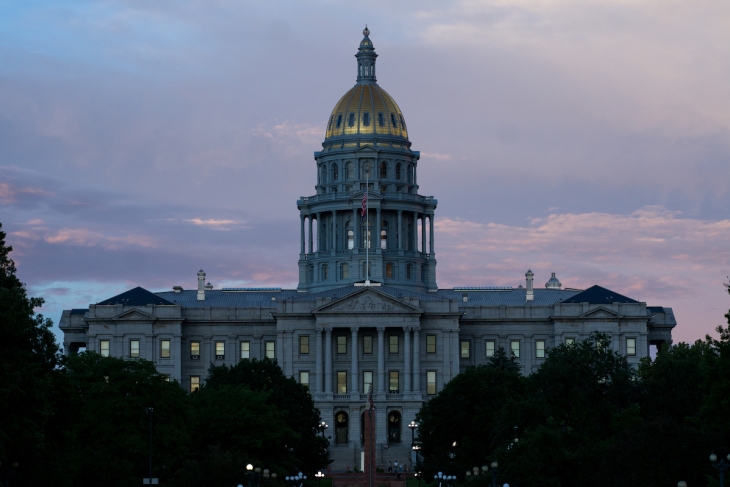The hits just keep on coming: Earlier this month, a motley crew of former Colorado lawmakers helped spur the introduction of a grotesque piece of legislation aimed squarely at dismantling the state’s venerable charter school sector. Under the guise of accountability, the bill—all fifty-five pages of it—would, if enacted, stifle the creation of new charter schools, smother the prospects for renewal of existing schools, and sabotage the systems that have helped them flourish over the last thirty years. Venom and hostility toward charters in some corners of the Centennial State are nothing new, but the sheer volume of anti-charter provisions stuffed into one package puts this particular bill in a noxious class of its own.
Indeed, there are too many policy transgressions to cover in one sitting, but consider five of the most egregious. The first is a provision that would give districts the power to revoke a school’s charter if the district is experiencing declining enrollment. (It also enables them to impose a moratorium on the approval of new schools.) Never mind a charter school that sees an uptick in kids as a result of its popularity or programming; so long as the district is losing students, charters located within it could be put on the chopping block. Suffice to say, this would corner them into an impossible situation in the face of declining enrollments both national and locally. In fact, Colorado’s public school rolls are at a decade low and are forecast to continue declining through 2029—at which time a rebound is expected, but the number of students is not projected to return to pre-pandemic levels until at least 2035.
Second, the bill would injudiciously equip every Tom, Dick, or Harry who lives within a school district’s boundaries with the means to appeal the school board’s decision to approve a charter application. It doesn’t require much imagination to see how this provision could be abused to gum up the works for charters. Former Indiana Governor Mitch Daniels once said, “When it comes to our children’s future, the real devil is not in the details. He’s in the delay.” This clause would give anyone with a beef against charters or choice de facto veto power. If you’re a potential school operator in Colorado, why would you subject yourself to such misery?
Third, the legislation preys upon the lack of access to adequate facilities that Colorado charter schools already face—one of the biggest barriers to growth. Under current law, school districts are required to provide charter applicants, upon request, with a list of vacant or underused buildings. Applicants may then apply to use these buildings and are not required to pay rent—a reasonable stipulation, given that charter schools already spend a considerable amount of per-pupil funding on operations and maintenance (to say nothing of the fact that these facilities were previously paid for by taxpayers). The troublesome new bill would repeal all of this in one fell swoop, effectively kneecapping any aspirations for charter expansion.
Fourth, the State Board of Education—which serves as a backstop against arbitrary and capricious decisions by local school districts—would lose its ability to effectively act as a check against them. A prominent feature of Colorado’s charter law, the appeals process, allows charter applicants to ask the board to serve as a referee when they feel they aren’t being treated fairly by districts. Over time, the decisions rendered by the board have been balanced and unbiased, with half of its rulings coming down in favor of districts and half in favor of charters. Put simply, altering the appeals process is a solution in search of a problem.
Finally, if the bill becomes law, Colorado’s charter schools would be subjected to additional and extraneous bureaucratic red tape from which they are currently spared thanks to “automatic waivers.” This flexibility allows charters, for example, to develop their own school calendar, pick their own curriculum, and hire and compensate teachers independent from the district. The bill’s authors claim that eliminating these waivers will lead to greater “transparency” and “accountability,” but the truth is that the forces behind this bill are attempting to hijack these terms for their own purposes. Here it’s worth noting the draconian consequences that would result if a charter fails to comply with the newly applied regulations (along with the other ticky-tack rules saturated throughout the bill): charter revocation or nonrenewal. It’s hard to read the motivation behind this legislation as anything other than cynical retribution.
Scheduled to be heard in Colorado’s House education committee early next month, the bill’s introduction came a few days before President Biden’s similarly mean-spirited (towards charters) education budget proposal, which seeks an unprecedented cut in the federal Charter School Program. Making matters worse, the National Alliance for Public Charter Schools—the nation’s leading trade association of charter schools and charter management organizations—is currently in a transition period. These are the times that try the souls of charter school advocates.
The silver lining, to the extent there is one, is that after thirty years, Colorado’s charter sector is a well-established constituency: 261 schools strong and serving 135,000 students, including my nine-year-old daughter. This kitchen sink of a bill stands little chance of making it through the legislature, let alone past the governor’s desk, given his background as founder of not just one, but two charter schools. Still, the brazenness of the legislation serves as a reminder that the forces of resistance and repeal are relentless, and will—despite the impressive track record of charter schools—continue their misguided effort to reverse the education tide.




